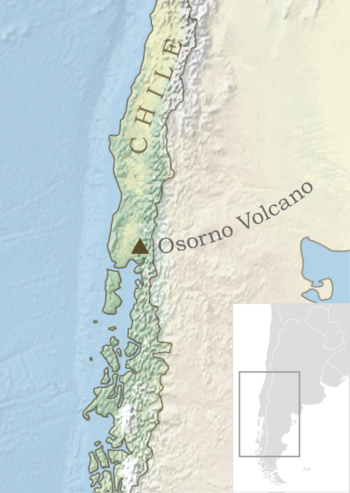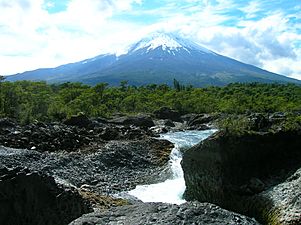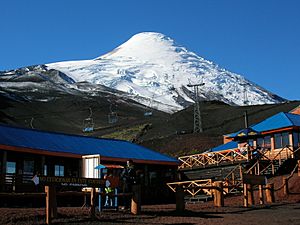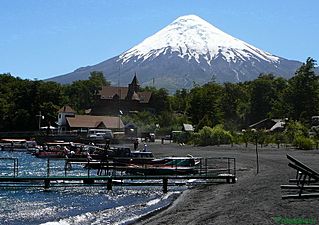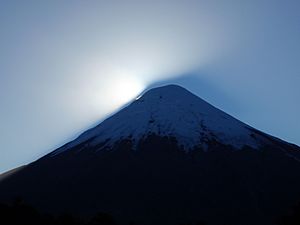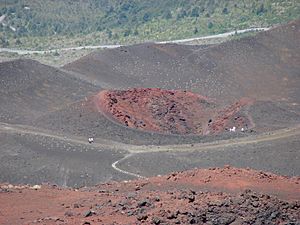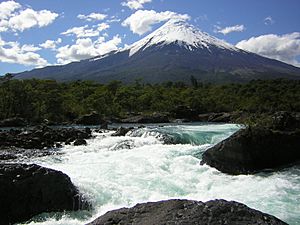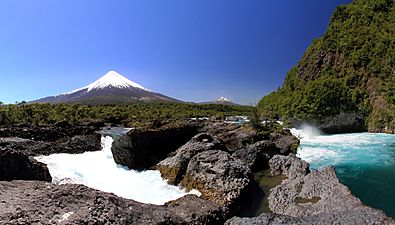Osorno (volcano) facts for kids
Quick facts for kids Osorno |
|
|---|---|
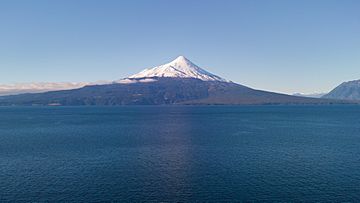
Osorno Volcano and Llanquihue Lake
|
|
| Highest point | |
| Elevation | 2,652 m (8,701 ft) |
| Geography | |
| Location | Chile |
| Parent range | Andes |
| Geology | |
| Mountain type | Stratovolcano |
| Volcanic arc/belt | South Volcanic Zone |
| Last eruption | 1869 |
| Climbing | |
| First ascent | 1848 by Jean Renous |
| Easiest route | rock/snow/ice climb |
Osorno Volcano is a tall, cone-shaped volcano in southern Chile. It stands 2,652 meters (about 8,701 feet) high. This impressive stratovolcano is located between the Osorno Province and Llanquihue Province. You can find it on the southeastern shore of Llanquihue Lake. It also rises high above Todos los Santos Lake. Osorno Volcano is a famous symbol of the area. It is often used to represent the region in tourism. Some people even say it marks the northern edge of Chilean Patagonia.
Contents
What's in a Name?
The volcano's name, Osorno, comes from the nearby city of Osorno. Spanish settlers could easily see the volcano from there. Native people had many different names for it. Some of these names were Purailla, Purarhue, Prarauque, Peripillan, Choshueco, Hueñauca, and Guanauca. Hueñauca and Guanauca were the most common names in the mid-1700s.
About Osorno Volcano
Osorno Volcano is 2,652 meters (8,701 feet) tall. It has a very impressive cone shape. It looks out over Llanquihue Lake. The cities of Frutillar, Puerto Varas, and Llanquehue are across the lake from the volcano. Osorno Volcano is a main feature of the region's landscape. You can see it from all over Osorno Province. It can even be seen from some parts of Chiloé Island.
The volcano is about 45 kilometers (28 miles) northeast of Puerto Varas. Even though it is an active volcano, it has not erupted in over 100 years. Its last eruption was in 1869. In recent years, the volcano has become a popular place for tourists. Many people enjoy skiing and hiking on the mountain. You can reach the volcano from the towns of Puerto Klocker, Ensenada, and Petrohué. The town of Las Cascadas is located at its base.
Volcanic Activity
Osorno Volcano is one of the most active volcanoes in the southern Andes mountains of Chile. It has erupted eleven times between 1575 and 1869. The volcano sits on top of an older volcano called La Picada. La Picada is 250,000 years old and has a large crater (caldera) that is 6 kilometers wide.
On January 19, 1835, a famous scientist named Charles Darwin saw Osorno erupt. He was near Ancud during his second trip on the ship Beagle. Darwin wrote about the eruption in his journal. He wondered if volcanoes far apart could erupt at the same time.
What Osorno Looks Like
When Osorno erupted, it produced basalt and andesite lava flows. These lava flows reached both Llanquihue Lake and Todos los Santos Lake. The top parts of the volcano are almost completely covered in glaciers. This is true even though it is not extremely high or far north. The glaciers are there because of the heavy snowfall in the region's very wet climate. Osorno has also produced pyroclastic flows in the past. These are fast-moving currents of hot gas and rock. Many people say Osorno Volcano looks very similar to Mount Fuji in Japan.
Image gallery
-
Petrohué Waterfalls (Saltos del Petrohué) with Osorno volcano in the background.
-
Osorno in front of the Petrohué Waterfalls.
See also
 In Spanish: Volcán Osorno para niños
In Spanish: Volcán Osorno para niños
- List of volcanoes in Chile
 | Anna J. Cooper |
 | Mary McLeod Bethune |
 | Lillie Mae Bradford |


